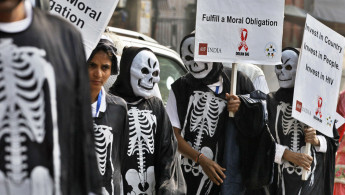Egypt pushed ban on gay groups attending AIDS conference
Egypt has led efforts to ban gay and transgender groups from attending a United Nations conference on AIDS next month.
Cairo wrote a letter last month to the organisers of the conference on behalf of 51 member of the Organisation of Islamic Cooperation asking for 11 groups to be blocked from attending.
The letter obtained by The Associated Press gives no reason for the objections, however, all the groups the OIC requested to be banned focus on gay, lesbian and transgender rights.
The NGOs were from Egypt, Estonia, Guyana, Jamaica, Kenya, Peru, Thailand, Ukraine, Africa and the United States.
US ambassador Samantha Power believes the groups were targeted because they work on gay and transgender issues. She asked for all groups that have requested participation to be allowed to attend.
"Given that transgender people are 49 times more likely to be living with HIV than the general population, their exclusion from the high level meeting will only impede global progress in combatting the HIV/AIDS pandemic and achieving the goal of an AIDS-free generation," she wrote to General Assembly President Mogens Lykketoft on 13 May.
According to the OIC letter to Lykketoft, the US group now banned from the conference is Global Action for Trans Equality.
The European Union have also expressed concern about the ban on gay and transgender groups attending the conference.
"If you're serious about getting to zero (AIDS cases), then it's vital to include all communities," Britain's deputy UN ambassador Peter Wilson said.
"It's wrong to block access to the UN for transgender organisations and gay organisations that have every right to participate in this important discussion."
When Lykketoft negotiated arrangements for the AIDS conference to be held at UN headquarters on 8-9 June, some members insisted on being able to object to an NGO's participation without any public explanation.
Over 400 NGOs wanted to participate in the meeting and Lykketoft's office said there were objections to 39, which the assembly president narrowed down to 22. The 11 others were not LGBT-related.
Lykketoft responded to the protests on Wednesday in letters saying that he had done everything in his power to ensure the broadest participation but he was limited by his mandate which did not allow him to provide the names of the objectors.
The United Nations has a difficult relationship with gay and transgender groups due to opposition from some member states, and only recently have any breakthroughs been made.
Earlier this week, the world body allowed a gay rights group to host a gala at UN headquarters for the first time and last August the Security Council held its first meeting spotlighting violence and discrimination against LGBT people.
Meanwhile, the Egyptian government has been accused of leading a campaign against its gay community with a spike in arrests since the 2013 military coup.





 Follow the Middle East's top stories in English at The New Arab on Google News
Follow the Middle East's top stories in English at The New Arab on Google News
![The UAE is widely suspected of arming the RSF militia [Getty]](/sites/default/files/styles/image_330x185/public/2024-11/GettyImages-472529908.jpg?h=69f2b9d0&itok=Yauw3YTG)
![Netanyahu furiously denounced the ICC [Getty]](/sites/default/files/styles/image_330x185/public/2024-11/GettyImages-2169352575.jpg?h=199d8c1f&itok=-vRiruf5)
![Both Hamas and the Palestinian Authority welcomed the ICC arrest warrants [Getty]](/sites/default/files/styles/image_330x185/public/2024-11/GettyImages-2178351173.jpg?h=199d8c1f&itok=TV858iVg)